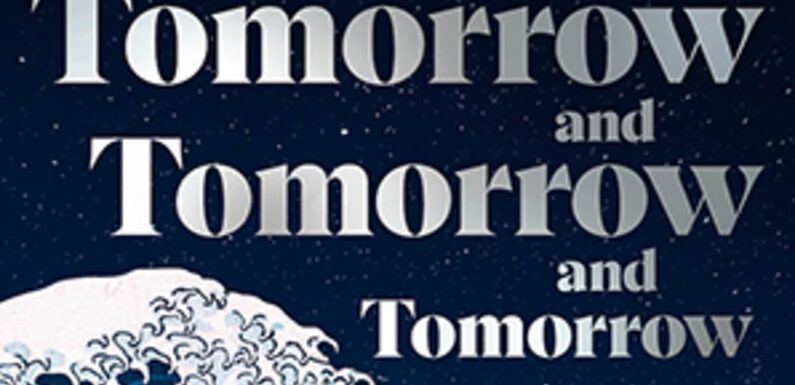
The nerdy novel that won over the world
It’s about video gamers, but don’t let that put you off GABRIELLE ZEVIN’s unlikely international bestseller – you’ll love it, says convert Sam Baker.
A dozen people told me to read Tomorow and Tomorrow and Tomorrow but for a long time I couldn’t see why. The book, written by Gabrielle Zevin, is a phenomenon. In 2021, before it was even published, its screen rights were bought for $2 million by Paramount Pictures in a 25-way auction. Since it came out in July 2022 it has spent 48 weeks on The New York Times bestseller list, been reprinted 21 times in the US and acquired more than half a million ratings on Goodreads. In the UK, it’s the fifth bestselling paperback of the year – beating David Walliams, Colleen Hoover and Stephen King.
But it’s about video gaming. Specifically, about two gamers called Sadie and Sam who bond as children in hospital over Super Mario Bros and, a decade later, start a gaming business. I’m 57, and my gaming experience is limited to Tetris and Candy Crush on my phone, as well as Sonic the Hedgehog, played with my stepson when he was small. It took me a while to see past the book’s geeky premise.
But I was wrong. Tomorrow isn’t just about computer games. It’s about love and friendship, betrayal and misunderstanding, success and failure. It’s about life and the way we let ourselves and each other down, as well as how we learn to forgive. Everyone who told me to read it said the same thing that I will say to you now: ‘It’s about video games, but you’ll love it.’ And you will.
No one is more surprised by this unlikely sales technique than the author. ‘It’s funny,’ Zevin tells me, on Zoom from her home in Los Angeles. ‘Whether it’s a professional critic or just regular people writing on Instagram, they almost always begin with a statement about their relationship to video games, like: “I have never played a video game before in my life. But I liked this book.” It’s not as if, when you read a book about the Second World War, you immediately feel the need to state your relationship to it, like, “I never fought in the Second World War” or “None of my grandparents fought.” But that’s the way people have talked about this book.’
Zevin, 46, has been published since she was 27, with ten novels to her name. Her career has had highs and lows. In 2005, her first two books were released within three months of each other and fared very differently. Elsewhere, a young adult novel about the afterlife, sold more than 300,000 copies and was a hit; Margarettown, an adult novel about a man who falls in love with a woman called Margaret Towne, erm, wasn’t.
‘When I wrote my first books and one did well, one did badly, it was quite humiliating to have failed so publicly,’ Zevin admits. ‘But over the years I have gotten quite good at failing, and failure can be very creative. If you let it.’
Things were comparatively uneventful until 2014 when she published her eighth novel, The Storied Life of A J Fikry, about a bad-tempered bookseller who’s been bereaved. It has sold more than five million copies worldwide.
However, in 2017, Zevin found herself in a slump. She was on tour with her ninth novel, Young Jane Young. ‘It was memorable for being one of the worst book tours I ever did,’ she says. ‘It was hurricane season in the US and the hurricane followed me from destination to destination. I’d get to Miami, and there’d be no food on the shelves because the delivery trucks couldn’t get in. Or there was a power failure in Atlanta. I got home from that book tour, and I remember feeling like…’ she sighs.
‘I found myself thinking about the video games I had played as a kid and trying to seek them out. But I couldn’t, because video games are tied to particular kinds of hardware, so they can disappear forever.’
It gave her an idea. ‘I just made a quick note: “Story of two video game designers, the games they make are their lives.”’ I didn’t really know anything else. I started researching it at the end of 2017, and really committed to it at the beginning of 2018. It was a slow process.’ She finished most of the writing by 2020.
As a lonely only child in early 1980s Florida, Zevin played games on her dad’s computer. (Both her parents worked for IBM, her dad as a programmer, her mum in marketing.) ‘I really responded to them because basically it was somebody to play with. I didn’t have to enlist anybody else to play the games with me. I could do that alone.’
Zevin describes her childhood as happy, ‘filled with books and Saturday morning trips to the library’. Her dad is of Jewish descent, her mum moved to America from Korea at the age of nine. Much like Sam in Tomorrow. Despite her parents working in tech, Zevin wasn’t interested in programming. ‘I always wanted to be a writer. My grandmother had an IBM Selectric typewriter,’ she says. ‘It was wonderfully clacky. You really felt like you were doing something when you were typing on it. So they propped me up on a stool. And I was just typing, not really words. I just liked the sound of the keys. So I think there was a tactile way [in which] I was drawn to writing.’
She got her first ‘real job’ at 14 as the teenage critic on her local paper, after writing an angry letter in response to a bad review of a Guns N’ Roses concert. Then she went to Harvard to study English. There she met her partner, filmmaker Hans Canosa. After a decade or so in New York, they now live in LA with their rescue dogs, Frank and Leia.
What did Canosa think when she told him she’d written a book about two computer gamers? ‘After he read it, he said: “You wrote this for me.” I said: “No, I didn’t. I wrote it for me.” Next I gave it to my agent, and he was like: “I think you wrote this for me.” And I said: “That’s really weird. Hans just said the same thing.” Since then that’s happened thousands of times. At events people still ask me to sign the book “for you”.’
How does it feel to have written one of those books – one people love so much, regardless of age, background and race? Zevin lets her character, Sam, answer:
‘In the book, Sam says he never realised a funny, mixed-race kid like him could be the centre of the world, and not just at its periphery. That’s how I feel too, because of the way people have chosen to see themselves in this. Most readers have nothing in common with the characters: they don’t do their jobs, they’re resistant to the concept. And yet, somehow, they still see themselves in it. I feel really honoured.’
Has Tomorrow’s success cast a shadow over what comes next? Zevin shakes her head. ‘This book has had an enormous and special reaction, one I’m so grateful for, but I don’t expect the next to be the same. I feel excited to get back to work in a way I’ve never felt before. For a long time, I felt an anxiety that I was always failing slightly. Relieved of that, I’m excited to go again.’
Tomorrow and Tomorrow and Tomorrow by Gabrielle Zevin is published by Vintage, £9.99. To order a copy for £8.49 until 24 December, go to mailshop.co.uk/books or call 020 3176 2937. Free UK delivery on orders over £25.
Source: Read Full Article

